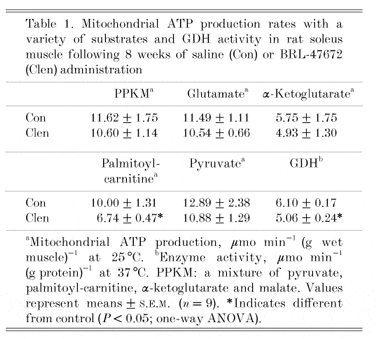Chronic administration of the β2-adrenoreceptor agonist clenbuterol induces the conversion of slow to fast fibres and increases the adenine nucleotide pool of rat soleus muscle (Rajab et al. 2000). To elucidate further the influence of β2-agonist administration on muscle energy metabolism, the present study investigated the changes that occur in mitochondrial ATP production rates following chronic administration of BRL-47672 (a clenbuterol pro-drug).
Experiments were carried out in accordance with the Animals (Scientific Procedures) Act 1986. Eighteen 4-week-old male Wistar rats were treated daily for 8 weeks with either a clenbuterol pro-drug (BRL-47672) at 900 µg (kg body mass)-1 (n = 9) or a saline solution (n = 9), via subcutaneous injection. Food and water were available ad libitum, and the animals were kept at a constant ambient temperature with light/dark cycles of 12 h. After 8 weeks, the animals were anaesthetised (Inactin, 120 mg (kg body mass)-1) and soleus muscles were exposed and removed before the animals were humanely killed. Approximately 100 mg of muscle was excised from the middle part of each soleus, weighed and used immediately for measurement of isolated mitochondrial ATP production rates with a variety of substrates, utilising a sensitive bio-luminometric method (Wibom & Hultman, 1990). The same sample was used at a later date for the measurement of glutamate dehydrogenase (GDH) activity that was selected as an indicator of mitochondrial density. The results are presented in Table 1.
Following 8 weeks of chronic clenbuterol administration, the activity of muscle GDH and the rate of mitochondrial ATP production derived from fat, i.e. palmitoyl-carnitine, had declined by 17 and 33 %, respectively. The present data therefore suggest that β2-adrenoreceptor agonist administration decreases fat oxidation, possibly as a consequence of a change in mitochondrial phenotype and/or a decrease in the population of slow muscle fibres.
This was supported by Pfizer Global Research & Development.

